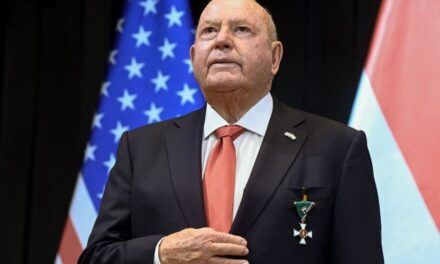The world's most expensive pub, Davos, is closed, where members of the so-called global elite sipped the World Economic Forum cocktail for five days. The 'highlight' of the celebrity party just lasted until it ended. We will remember it next year.
What is Davos really like? According to some opinions, it really is a summit meeting of the global elite, where decisions are made secretly in the depths of smoky back rooms in godfather style about the shaping of world politics and the economy, à la illuminati. Others say that Davos is literally an inflated balloon, a bubble, where the world's richest people and most influential politicians pretend to know anything about people's real problems, and then - by legal means - figure out what they really are. There are also those who believe that Davos is nothing more than the ego of an 86-year-old man, Klaus Schwab, since 1971, who would now be a multimillionaire (if it wasn't that long ago) that he collected from the price of the entrance tickets.
In fact, Davos is nothing more than an increasingly embarrassing celebrity party, where the program is just the gold crumb next to the truffle, because the real fun always goes on behind the stage. Relationship building and business. That's really what Davos is all about, who says what in the lectures and panel discussions is totally twenties. As Elon Musk put it a few years ago:
I declined the invitation to Davos not because I was afraid of becoming a participant in a diabolical plot, but because it was boring.
Did anyone seriously care about the Chinese Prime Minister's warning about the devastating effects of blockade, disruption of supply chains and falling to pieces of world trade? Did anyone really pay attention to the Zelensky show? Did anyone think that the president of Argentina was really invited to give a lecture because of his thoughts or because he acts like a broken rock star and is good for a laugh? Did anyone take seriously the words of the US Secretary of State about the role of the US as a vacuum-filler? Come on. The main thing in the Chinese delegation was not the prime minister, but the 150 businessmen who accompanied him. Zelensky's dramatic presentation was just a dusting of dust, the real show took place before that, when the Ukrainian prodigy met more than half a hundred Western investors. Blinken actually went on a desperate agitation, looking for allies while confidently pointing to Washington as the alpha male, and Milei held about half a dozen backroom meetings with investors and decision-makers, including IMF president Kristalina Georgieva — after sending everyone on stage to boo.
It is customary to talk about the decline of Davos as if the event itself had ever been a prominent factor, even though its significance is only measured by those who are either invited (those are the real celebrities) or shell out a horrendous amount for a ticket (those who dress up as celebrities, and they bask in the light of the underlit set sun for five days). A COP climate conference is even more exciting than the public part of the World Economic Forum, at least there you can place bets on how long it will take for the happily announced decisions to be implemented - even this joy is not given here, since there are no decisions. We don't know what they are. The current, ever-changing "elite" (except for Klaus Schwab, who is a permanent fixture) makes deals not in front of the cameras, but during breaks in clichéd conversations and monologues.
To stay at the table:
Davos is the place where, in the restaurant section, surrounded by envious glances, the gentlemen audience enthusiastically eats a 0.5-gram main course dwarfed on a plate, but dressed in a tuxedo, and then runs back to the kitchen and pulls in front of them the tenderloin with stew juice from the fridge. With peasant bread.
Disturbance in the force
At this year's forum, in a not at all entertaining way, it was revealed that the Davos ideal, sworn to globalization, is actually kicking the last ones. After its celebrities have devoted fifty years to enforcing the will of a unipolar world order under the guise of globalization and forcing it on everyone (or anyone who stands in their way), you can feel the bewilderment behind the superficial presentations and conversations, when the blockage begins before their eyes, the trade war is raging and a polycrisis that could otherwise really only be solved by global cooperation.
But the essence of Davos is also the paradox of the unipolar world order: "then I will decide what you like!".
And no, no one laughed at the increasingly desperate US Secretary of State Anthony Blinken, who tried convulsively to prove that the United States is still the only savior solution in conflict management, then blurted out that it was not because he is so good at it, but because because without it, a power vacuum would develop, and that vacuum could only be filled by actors worse than the USA.
What do we see? The billionaires' club that once declared war on nation-state economic aspirations and sovereignty watches in despair as its imagined world crumbles around it as it wails about rebuilding the global loss of trust.
Then Ursula von der Leyen takes the microphone, who totally politicizes world trade in her speech, and then, according to the taste of Washington's mouth, gives it to the Chinese Prime Minister (who, poor man, still argues against the blockade): "The freedom of business depends on the freedom of our political systems." And speaking of Washington: the importance of Davos this year is perhaps well indicated by the fact that the minimal American delegation spent practically a single day at Schwab's theme park, then hurriedly left to deal with the great global vacuum that only the United States can fill, the total failure of its foreign policy, its economy protectionism reached its peak there.
In the private rooms in Davos, of course, business went on in the same way as always, people who were called smart on stage said things they thought were extremely smart - sometimes at the level of elevation of the regular audience drinking beer in front of the corner traffic. No one laughed, for example, when the "philanthropist" Bill Gates and the tech moguls took care of all the concerns about artificial intelligence with a wave of the hand, and their biggest fear took the form of how important it might be in disinformation processes (elections are coming!). the technology they developed.
Meanwhile, the International Monetary Fund worries about 40 percent of the world's jobs, but it didn't shout "Skynet" loud enough, so the laughter of Big Tech drowned out its whispers. And poor UN Secretary-General Guterres, who, as a rare exception dared to say that if the boys on high do not get their act together, are still unwilling to talk to each other and their problem-solving skills are exhausted by shucking an oyster in the "We'll solve it" buffet in Davos, then the geopolitical collapse and the lack of global regulation of artificial intelligence, the party will be over sooner than anyone thinks.
Polite applause, yawns and selfies.
Scratches
Those who see Davos as some kind of mystical bubble where the participants have nothing to do with real global problems are very much mistaken. In fact, they are talking, laughing, whispering and worrying about what we all are, even if not so concentrated. Wars, global trade, artificial intelligence, climate change, electric vehicles, energy prices, inflation, debt. They are the central topics of our daily lives, about which we argue in the same way as the supermen of Davos, with the difference that everyone tends to pay attention to them as if they have never heard of them before. (Annalena Baerbock, Germany's minister of humor and foreign affairs, did not let the fans down and made such profound statements about the war in Gaza as: "We demand a cease-fire, because it does not fall into our laps by itself", all in English, "falls not from the sky ” with the words, which made the audience feel good again, but really, damn it, he thought.)
The Davos recipe remains the same: 1,000-2,000 people meet each other in order to build up relationships and real capital, and while drinking a lot of alcohol, they try to prepare the most advantageous deals for their country or company, while they conduct face-to-face conversations with the general public, which have neither real effect nor it doesn't have any content that could at least start in one direction.
Always the most rewarding keynote presentation, after which there is no discussion, just a quick google for the drink bar selection.
While thousands of world-changing platitudes related to global crisis trends are flying from the stage, the calendar displays in the hands of the audience discreetly light up the date of the next face-to-face meeting, where the talk will be about something much more down-to-earth and essential: money.
Davos doesn't solve anything, it doesn't even raise problems that aren't on the agenda every day anyway. It does not offer solutions, it does not make decisions. Davos is just a bluff, a camouflage net at the world's biggest networking festival. A business that lives off of business. It can be treated this way and only this way.
When it's over and the billions of dollars have changed hands in the back rooms - where you can faintly smell perfume and Dom Pérignon for days - the world goes on exactly as it went before. Without consensus, agreement or solution, floundering, more and more disillusioned and broken.
In the sudden silence, Herr Schwab can finally deal with income accounting, and in Davos you can go skiing again.
Order has been restored. This was the goal.
Featured image: MTI/EPA-KEYSTONE/Gian Ehrenzeller












